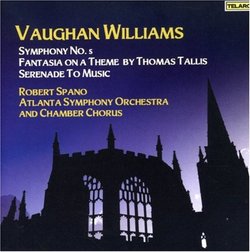| All Artists: Atlanta Symphony Chamber Chorus Title: Vaughan Williams: Symphony No. 5/Fantasia on a Theme by Thomas Tallis Members Wishing: 0 Total Copies: 0 Label: Telarc Original Release Date: 1/1/2007 Re-Release Date: 4/24/2007 Genre: Classical Styles: Opera & Classical Vocal, Historical Periods, Modern, 20th, & 21st Century, Symphonies Number of Discs: 1 SwapaCD Credits: 1 UPC: 089408067624 |
Search - Atlanta Symphony Chamber Chorus :: Vaughan Williams: Symphony No. 5/Fantasia on a Theme by Thomas Tallis
 | Atlanta Symphony Chamber Chorus Vaughan Williams: Symphony No. 5/Fantasia on a Theme by Thomas Tallis Genre: Classical
In 2003, Robert Spano and the ASO won three GRAMMY awards for Vaughan Williams' "A Sea Symphony" (Best Classical Album, Best Choral performance and Best Classical Engineered Album). The album was hailed by The Philadelp... more » |
Larger Image |
CD DetailsSynopsis
Album Description In 2003, Robert Spano and the ASO won three GRAMMY awards for Vaughan Williams' "A Sea Symphony" (Best Classical Album, Best Choral performance and Best Classical Engineered Album). The album was hailed by The Philadelphia Inquirer as "...one of the most distinctive recordings ..." and the Symphony Magazine called the ASO Chorus' command of Vaughan William's fascinating and varied choral effects "...simply spectacular." The critical acclaim is likely to continue for this new recording of Vaughan Williams' music. Anchoring this brilliant disc is the composer's peaceful Symphony No. 5 which was first heard in 1943 in the midst of World War II. A departure from his angry and strident Fourth Symphony, Symphony No. 5 was welcomed as an island of serenity in a time of great uncertainty. Vaughan Williams' Fantasia on a Theme of Thomas Tallis is considered by many to be the composer's first indisputable masterpiece and has been featured in several films, including Remando al viento in 1988 with Hugh Grant and Elizabeth Hurley and Master and Commander: The Far Side of the World in 2003 with Russell Crowe. Opening the disc is the Elizabethan church composer Thomas Tallis' four-part a cappella hymn "Why fum'th in fight," a paraphrase of Psalm 2 "Why do the nations rage?" which is one of nine Psalm settings by Tallis. This tune is the basis for Vaughan Williams' Fantasia. The composer's Serenade to Music has been called one of the most sublime musical creations of the 20th century. Set to the final scene of Shakespeare's The Merchant of Venice, it was originally created for 16 soloists, but the composer designed the work so that it could also be performed by four soloists and chorus. This work was composed for and dedicated to Sir Henry Wood - who instituted London's Promenade Concerts - in celebration of his 50th anniversary as a conductor. Similar CDs
|
CD ReviewsWonderful Performances, Especially of the Symphony M. C. Passarella | Lawrenceville, GA | 12/24/2007 (5 out of 5 stars) "This CD usefully and attractively collects some of Vaughan Williams' most serenely beautiful music, including his "other" pastoral symphony, the Symphony No. 5 written in the early years of World War II. As the notes to the recording state, the first hearers of this symphony were possibly perplexed to hear this gentle successor to the angry, militant Symphony No. 4 completed in 1934 as war clouds gathered over Europe. I guess it just goes to prove that interior states and external events don't always square with one another in the creative life. After all, Beethoven and Mozart both created some of their sunniest and most confident works at difficult periods in their lives. And there's no indication that Mozart was in extremis when he wrote some of his most tragically intense compositions, such as the Piano Concerto No. 20 and Symphony No. 40. So how to explain the pastoral radiance of Vaughan Williams' Fifth? No way to fully explain it, perhaps. However, the notes to the recording reveal that Vaughn Williams wrote the symphony while working on his opera The Pilgrim's Progress, so it's not surprising that the two works share the message of comfort in adversity that is at the heart of John Bunyan's allegorical tale. Actually, when I first heard this symphony, in a critically acclaimed version by Previn back in the 1970s, I really didn't get it. I thought it was a pale sibling of the hard-hitting Fourth; the alternately manic and depressive Sixth; the cinematic Seventh; the brilliantly orchestrated, classically proportioned Eighth. But certainly I get this symphony in Spano's fine performance. He shapes the long melodic lines with tenderness and yet finds the points of tension, in the first and last movements especially, that reflect the troubling times in which the work was written. And Spano addresses the quiet affirmation of the slow movement, the elfin quirkiness of the woodwind-dominated scherzo, with equal success. No small thanks are due the Atlanta Symphony, playing about as beautifully as I've heard them play, and a Telarc recording that is just gorgeous, imparting a sheen to the strings and a golden flare to the brass that you won't hear, sadly, in person at Atlanta's Symphony Hall. How Telarc is able to achieve such fine results in so deficient a hall is beyond me. The other pieces on the recording, even the substantial Serenade to Music, can be viewed as bonuses. Spano's is an excellent performance of the Serenade, but any recording must be measured against the classic one by Adrian Boult, who performs the original version for sixteen solo voices. The original version is uniquely lovely, and Boult's recording featured the finest singers in England at the time, including Norma Burroughs and Ian Partridge. Still, Spano's forces are all very convincing in his recording, and the superb digital sound is a significant plus. It's also very nice to hear the short hymn tune by Thomas Tallis on which Vaughan Williams' famous Fantasia is based. But the reason to get this disc is the performance and recording of the symphony. Even if you own another version, this will be an ear-opener for you. " Over an hour of gorgeous music Samer T Ismail | Danbury, CT | 09/07/2007 (5 out of 5 stars) "Two of the works on this disc--Vaughan Williams' Fifth Symphony and the Tallis Fantasia--are actually rather hard to review. That's because the works themselves are so sublimely written (the reception the Fifth received, according to one VW scholar, was on par with Beethoven's Ninth) that even a barely competent performance will sound beautiful. Needless to say, though, Atlanta's performance here is far better than "barely competent." And while there are a couple of spots where Spano makes slightly unusual performance choices, the beauty of these works is never obscured. That said, my main reason for buying this CD was not the orchestral works; I already have four or five copies of each. Rather, it was the choral tracks that open and close the disc.
The opening track is actually a performance of the "Theme by Thomas Tallis" quoted by Vaughan Williams in the Fantasia, performed by 20 members of the Atlanta Symphony Chamber Chorus. (Kudos to Telarc, by the way, for actually listing all the members of the orchestra and chorus.) Surprisingly, given the relative simplicity of the piece, this is the first CD I know of that includes both the Fantasia and the original theme. The closing track contains what is--by comparison to the other Vaughan Williams works--a relative rarity, the "Serenade to Music." This piece, perhaps even more beautiful than the Fantasia and Symphony, is a setting of a scene from Act V of "The Merchant of Venice." Originally written for 16 soloists, Vaughan Williams reworked it (slightly) so that it could be performed by a four-part chorus with soloists--and that is the version here, featuring the full Chamber Chorus of about 80 members. And while I can't say that the choral version is my favorite version for the Serenade (that would have to go to the near-perfect 16-soloist Hyperion version), this version is, again, far more than "adequate." Needless to say, I cannot recommend this disc highly enough. (If you can afford it, I'd get the Hyperion disc too, since the only work they have "in common" is the Serenade.)" |

 Track Listings (7) - Disc #1
Track Listings (7) - Disc #1